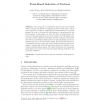Free Online Productivity Tools
i2Speak
i2Symbol
i2OCR
iTex2Img
iWeb2Print
iWeb2Shot
i2Type
iPdf2Split
iPdf2Merge
i2Bopomofo
i2Arabic
i2Style
i2Image
i2PDF
iLatex2Rtf
Sci2ools
277
click to vote
ECWEB
2011
Springer
2011
Springer
Trust-Based Selection of Partners
The community of multi-agent systems has been studying ways to improve the selection of partner agents for joint action. One of such approaches consists in estimating the trustworthiness of potential partners in order to decrease the risk inherent to interacting with unknown agents. In this paper, we study the effect of using trust in the process of selecting partners in electronic business. We empirically evaluate and compare different trust-based selection methods, which either use trust in a preselection phase previous to the negotiation, in the negotiation process, or in both of these stages. We here briefly introduce a computational model of trust that uses a simple machine learning mechanism to dynamically derive the expected tendencies of behavior of potential candidate partner agents. The results obtained in our comparison study allow us to point to the best trust-based selecting methods to use in specific situations.
Related Content
| Added | 19 Dec 2011 |
| Updated | 19 Dec 2011 |
| Type | Journal |
| Year | 2011 |
| Where | ECWEB |
| Authors | Joana Urbano, Ana Paula Rocha, Eugénio C. Oliveira |
Comments (0)

